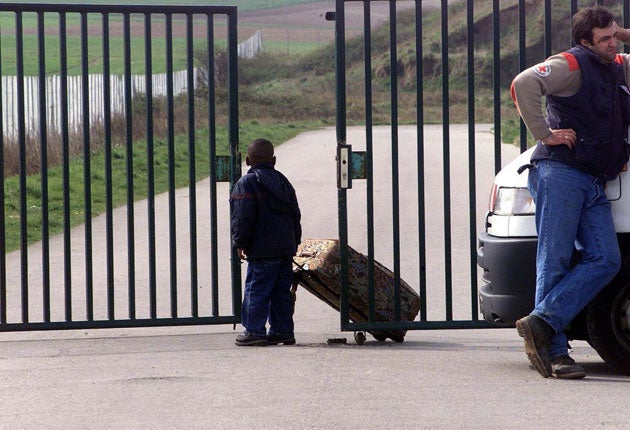Child asylum-seekers targeted in Home Office budget cuts

Thousands of child asylum-seekers are to be removed from Britain under savage budget cuts being drawn up by the Home Office ahead of this week's comprehensive spending review.
A briefing document sent to ministers sets out detailed proposals to remove child refugees before they reach 17 years old, and recommends bearing down on benefits given to asylum seekers.
The UK Borders Agency (UKBA) plans to cut a third of its staff by 2014, prompting fears of security risks at British ports and airports.
Under the proposals, the UKBA says it would be able to reduce its annual £2.45bn budget by £346m.
Setting out a number of options for cutting costs, the document reads: "We need to resolve underlying trend on asylum support ... On asylum support this will involve, for example, continuing recent tightening of entitlement to support, removing minors before they reach the age of 17 ..."
But the Home Office is also considering saving money by offering a partial amnesty to asylum-seekers whose claims have been delayed by processing backlogs.
The paper recommends "continuing to consider grants [of the right to stay in the UK] where agency delays mean even failed asylum-seekers are still in-country after several years".
There are further plans to end the right of appeal to those applying for migration visas outside the UK, to reduce costs.
But of greatest concern will be a policy of mass removal of unaccompanied children before they reach 17 and a half, the age when they are deemed to be adult asylum-seekers.
Under current rules unaccompanied child asylum-seekers are usually granted leave to remain in the UK until they can make a fresh asylum application as an adult.
There are more than 4,200 unaccompanied child asylum-seekers in Britain, with most being supported in local authority social services homes.
Emma Ginn, of the charity Medical Justice, said last night: "Many unaccompanied children are orphans. Many have escaped various forms of slavery, war and being made into child soldiers. To deport vulnerable unaccompanied children is despicable. To do it to save money is indecent ... How we treat asylum-seeking children is already uncivilised, but to sink this low would cost our international reputation dearly."
The document says: "In total these [cuts and policies] could deliver up to £346m of annualised cash savings by 2014/15 which would allow a reduction in taxpayer funding of £53m. It would mean around 3,500 more staff cuts (ie more than 7,000 from 2010/11 to 2014/15 or almost a third of our current complement). This would imply a virtual doubling of caseworker productivity as a result of management culture and technology enabled redesign. It would mean a large percentage of travellers passing through automated gates at the border and more risk-based controls based on improved intelligence and scanning capability."
But the officials warn: "These changes obviously involve significant level of management, project and implementation risk. ... If bigger budget reductions are needed or to be able to deal with some of the funding and cost pressures from manifesto commitments we will need to go further."
Paul O'Connor, the Home Office group secretary of the Public and Commercial Services union (PCS), said that cutting staff would lead to security risks from international criminal smuggling gangs and child and sex traffickers.
He said: "There should be no compulsory redundancies. In terms of frontline security our members are the first port of call to maintain proper border controls. If they decide to cut one in three this country will be less safe and lead to a massive exploitation of young people."
He warned that job losses would also have an effect on the backlog of asylum cases built up over the last few years. "We expect services to be diminished because there will be fewer people to deal with the backlog, which will get worse ... All this experience and skill built up over the years must not be jettisoned on the altar of the cuts."
One of the proposals outlined in the document has already been implemented. The £50m Immigration Impact Fund, which gives aid to local authorities to help support asylum-seekers living in their region, was quietly dropped over the summer.
And it was reported earlier this year that the Home Office was preparing to set up a £4m "reintegration centre" in Afghanistan so that failed Afghan child asylum-seekers can be returned home. An organisation is being sought to run the centre in the capital, Kabul, which would aim to help their resettlement. The aim is to assist 12 boys a month, aged 16 and 17, and 120 adults.
A spokeswoman for the UKBA said no decisions would be taken until the Government had completed its comprehensive spending review. She said no budget figures or policies had been confirmed.
Join our commenting forum
Join thought-provoking conversations, follow other Independent readers and see their replies
Comments
Bookmark popover
Removed from bookmarks